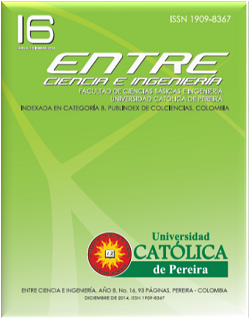Evaluation of Nash equilibrium in order to Provide QoS Based on Delay in IEEE 802.11 Wireless Networks
Keywords:
games theory, noncooperative games, 802.11 wireless networks, quality of service, Nash equilibrium, end to end delayAbstract
This article addresses one of the problems currently present in wireless communications: guarantee quality of service from the perspective of end-to-end delay in IEEE 802.11 networks. Due to the delay that occurs in some services such as audio, video and other applications; the result of this research, presents a possible solution to the above problem. To address this approach, a model of game, in which users are provided access to different network access points that service is used, in this case the players act non-cooperatively, where the game is modeled as a static game, ie assuming that users make decisions simultaneously. The solution concept used is the Nash equilibrium (EN) under equilibrium arguments, this solution concept does not imply that the best overall result for users, only the best result for player considered individually, an algorithm is achieved is designed and implemented and to find this equilibrium, maximizing the utility of users.
References
Pérez J., Jimeno J., y Cerdá T.,E., Teoría de Juegos. Madrid, España: Pearson Educación, 2004.
Dimitris E.,Charilas y Athanasios D. ,Panagopoulos, «A survey on game theory applications in wireless networks», 2014. [En línea]. Disponible en: http://www.sciencedirect.com/science/article/pii/ S1389128610002239. [Accedido: 15-feb-2014].
Khodaian, A.M. y Khalaj, B.H., «Delay-constrained utility maximisation in multi-hop random access networks», Communications, IET, vol. 4, n.o 16, pp. 1908 - 1918, 2010.
I-Hong Hou y Kumar, P.R., «Utility Maximization for Delay Constrained QoS in Wireless», presentado en INFOCOM’10 Proceedings of the 29th conference on Information communications, San Diego, CA, 2010, pp. 1-9.
Meshkati, F., Poor, H.V., Schwartz, S.C., y Balan, R.V., «Energyefficient power and rate control with QoS constraints: a gametheoretic approach», presentado en Proceedings of the International Conference on Wireless Communications and Mobile Computing, IWCMC 2006, Vancouver, British Columbia, Canada, 2006, pp. 1435-1440.
Meshkati, F., Poor, H.V., Schwartz, S.C., y Balan, R.V., «Energyefficient resource allocation in wireless networks with quality-ofservice constraints», Commun. IEEE Trans. On, vol. 57, n.o 11, pp. 3406 - 3414, 2009.
Trujillo Dávila, D. L., «Selección de Access Point en redes 802.11 garantizando mínima capacidad para QoS: “una perspectiva desde la teoría de juegos no cooperativos”», Trabajo final de pregrado, Programa de Ingeniería Electrónica - Universidad del Quindío, Armenia Quindío, 2012.
Londoño Cano, A., «Selección de Access Point en redes 802.11basado en restricciones de ancho de banda», Trabajo final de pregrado, Programa de Ingeniería electrónica - Universidad del Quindío, Armenia Quindío, 2013.
Lasaulce, S., Debbah, M., y Altman, E., «Methodologies for analyzing equilibria in wireless games», Signal Processing Magazine, IEEE, vol. 26, n.o 5, p. 41|52, 2009.
Mittal, K., Belding, E., y Suri, S., «A Game-Theoretic Analysis of Wireless Access Point Selection by Mobile Users». 2000.
Perlaza, S.M., Belmega, E., Lasaulce, S., y Debbah, M., «On the base station selection and base station sharing in self-configuring networks», presentado en Proceedings of the Fourth International ICST Conference on Performance Evaluation Methodologies and Tools, Paris, 2009, p. 71.
Eumednet, «Introducción a la teoría de juegos». Universidad de Málaga, 2012. [En línea]. Disponible en: http: http://www.eumed. net/cursecon/juegos/index.htm. [Accedido: 20-feb-2014].
Astaiza H., E., «Introducción a la teoría de juegos en comunicaciones inalámbricas», Universidad del Quindío, Armenia Quindío, Trabajo de ascenso de categoría, 2013.
Monderer, D. ; et al, «potential game», Games and Economic Behavior, vol. 14, n.o 44, pp. 124-143, 1996.
Neely, M.J., «Delay-Based Network Utility Maximization», presentado en Networking, IEEE/ACM Transactions on, San Diego, CA, 2013, vol. 21, pp. 41-54.
Rufasto, A., «Manual de teoría de juegos». Indecopi, 201d. C.








 Revista Entre Ciencia e Ingeniería
Revista Entre Ciencia e Ingeniería .png) entrecei@ucp.edu.co
entrecei@ucp.edu.co.png) ISSN (Impreso) 1909-8367 - ISSN (En Línea) 2539-4169
ISSN (Impreso) 1909-8367 - ISSN (En Línea) 2539-4169 Attribution-NonCommercial 4.0 International (CC By-NC 4.0)
Attribution-NonCommercial 4.0 International (CC By-NC 4.0)
.png) Carrera 21 No. 49-95 Av. de las Américas, Pereira, Risaralda, Colombia
Carrera 21 No. 49-95 Av. de las Américas, Pereira, Risaralda, Colombia